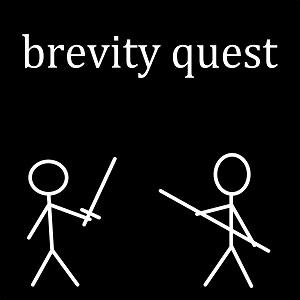By Chris Longhurst. (Twine; IFDB; play here)

A RPG in the barest sense of the word. You choose a class. You encounter characters and go places, each narrated within the space of one line. The brevity of each passage belies a very broadly branching decision tree. In fact, given how widely stories could diverge, I found the narration of your choices in the end to be a nice touch. brevity quest makes liberal use of familiar tropes and creatures, making the reader’s imagination take up most of the storytelling slack.
Several games share the text-sparse, location-based mould. A few which come to mind: The Tiniest Room, vale of singing metals or even burning temples.
What makes these worth having a look at are how they simplify foreign terrains, diplomatic moves and combat into the sparse language they use. I found pleasant small surprises, at times, when the game (brevity quest, but the others as well) showed me that it wasn’t just branching blindly – it remembered the decisions that I made. Of course, this is technically very easy to do, but satisfying nonetheless.
Worth playing if you want a time cave RPG with sparse prose.
